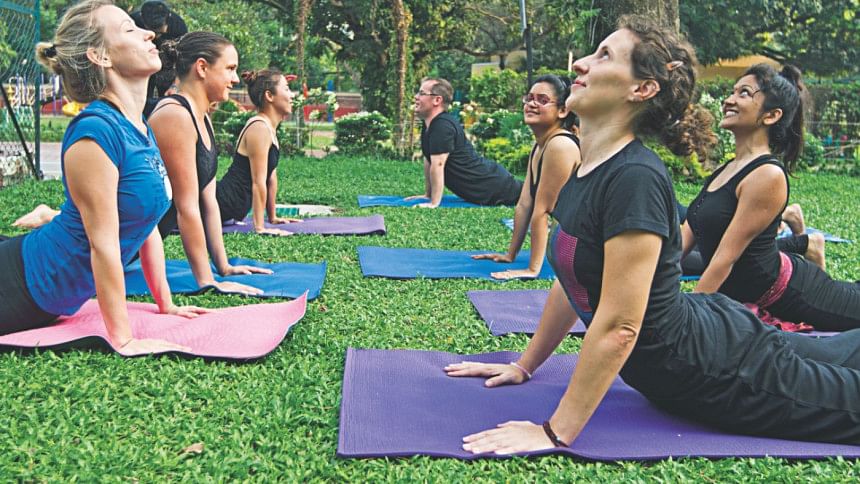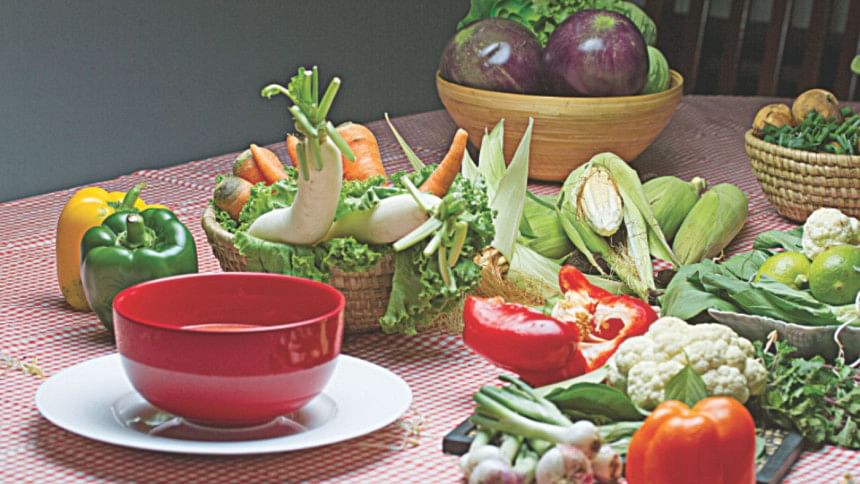Ramadan calling!

Fasting is an essential part of faith in innumerable religions spread across the world. Yet, the fundamental difference between fasting in Islam and other beliefs is that the one prescribed in the sacred book of Islam ensures that although abstinence is there, the permitted period of food consumption guarantees that there is no real chance of malnutrition or inadequate calorie intake.
HOW DIFFERENT IS ISLAMIC FASTING?
The basic difference between abstinence in Ramadan and total fasting is the timing of the intake of food. We basically miss lunch, have an early breakfast and do not eat until dusk. Nothing more.
Even the insufficient supply of water, which is essential for human survival, does not have an adverse impact — it adjusts the concentration of all fluids within the body, resulting only in a nominal state of dehydration, which itself has beneficial effects.
As the fast only lasts between dawn and dusk, the body's energy can be replaced in the pre-dawn (sehri) and dusk (iftar) meals. This results in a slow transition from using glucose to fat as the main source of energy, and prevents the breakdown of muscles for protein.
OF RELIGION AND SPIRITUALITY
One of the five pillars on which the monotheistic religion of Islam stands upon, fasting is primarily a religious obligation and a spiritual experience. Yet, the design of a month-long fast makes it clear that Islam is pragmatic even in its obligatory duties.
While fasting is ordained for all Muslims, it is not obligatory for the elderly, the young or the ill, and people suffering from some other clinical, or non-clinical circumstances. From a nutritional point of view, fasting in the month of Ramadan is not a burden, but rather, a manner of reaping physical and, as research shows, even psychological benefits. This, as many claim, is proof that Islam is a pragmatic religion that addresses the realities and more.
THE SCIENCE
To maintain a healthy life, every human being needs a certain number of calories, which differs from person to person. While it is true that generally during Ramadan the body is somewhat deprived of its total calorie count, any form of short fast, lasting anywhere from 20 to 36 hours, can in fact, reduce risks for heart disease, diabetes, and possibly, even cancer!
The changes that occur in the body depend on the duration of the fast. In the month of Ramadan, for a practicing Muslim, the body enters into a deprived state for approximately eight hours. In a normal person, body glucose, which is stored in the liver and muscles, is the body's main source of energy. While fasting, this store of glucose is used up first to provide energy. Once the body runs out of the stored glucose, it starts using up from the fat reserve.
Short fasts also reduce oxidative stress and inflammation in cells. Many theorise that this helps prevent and even repair damage to our DNA; studies have linked damage to the DNA with developing cancer.
Scientists also have strong arguments for fasting as an anti-ageing method. In other words, fasting just may help us keep our organs health and this prolonging life.
POTENTIAL BENEFITS
The body
The kidneys, our primary excretory organ, are efficient at maintaining the body's water and salts, such as sodium and potassium. To aid in the proper functioning of the kidneys, and to prevent breakdown of muscle, we should maintain a balanced diet with the right proportion of carbohydrates, fat and protein.
The physiological effect of fasting includes lowering blood sugar level, cutting on cholesterol, and moderating systolic blood pressure. In fact, fasting can be recommended for treating mild to moderate, stable, non-insulin diabetes, obesity, and hypertension.
The benefits however do not stop there — fasting has been proven to be beneficial for the gut and aid in curing or managing chronic stomachache, inflammation of the colon, liver diseases, and indigestion.
Other major benefits that can be linked with the Islamic way of fasting in Ramadan are arteriosclerosis, hypertension, asthma, even diphtheria!
The mind
Fasting has been found to be an effective treatment for psychological and emotional disorders. It helps people build self-esteem and a strong will, cultivate and refine their taste and manners, and strengthen convictions, which ultimately all contribute towards a sound and healthy lifestyle.
Besides conditioning for abstinence, fasting also reflects on outward physical appearance by help cutting out gluttony, and getting rid of excess fat, which, in today's world, is a major medical issue.
Detox
One common term that gets thrown around is 'detox'. However, only a few have a clear idea about what detox actually refers to, and how Ramadan can be linked with it.
Detoxification is one of the more widely used treatments based on the principle that health can be hampered if toxin (toxic substance) becomes high in the bloodstream. Detoxification takes place when any toxins in the body's fat reserve are dissolved and removed from the body.
After a few days of fasting, higher levels of endorphins (a hormone) appear in the blood, which, without us even realizing, make people alert, giving an overall feeling of mental wellbeing.
A BALANCED DIET FOR RAMADAN
If the MET office predictions are anything to go by, Ramadan 2018 will be hot and humid. No surprises there! The prevailing climate calls for special attention to what we consume throughout the month.
Sehri vs Iftar
The biggest mistake in our Ramadan diet plan is that we focus too much on the iftar and not the sehri. From a nutritional point of view, it is essential that one never skips this late meal before dawn.
The ideal sehri should be a wholesome, moderate meal that is filling and provides enough energy for many hours. Sehri should be light and incorporate slow digesting food (complex carbohydrates) like whole wheat, brown rice, brown bread or oats.
Adding some first class protein such as meat, fish, egg, or milk is equally important. One serving of fruit or vegetable can meet our dietary requirement for vitamins and minerals. A diet rich in fibre will not only save you from extreme hunger pangs, but also contribute to proper digestion, and relieve constipation — a common problem during Ramadan.
For iftar, it is very important to include foods that help in rehydrating the body, especially foods rich in potassium — coconut water, dates, potatoes, watermelons, bananas, green mangoes etc. During iftar, it is important to have plenty of fluids rich in vitamins and minerals. At least two servings of fruits or juices should be included for the desired effect.
Following the tradition of the Holy Prophet (PBUH), Muslims break their fast with dates. It is common knowledge that dates are good sources of energy and a natural dietary supplement. Yet, there is more to it!
Dates are a unique blend of glucose and fructose, and have high potassium content (about 64 percent more than bananas); what most people miss is that this helps in rehydration process, and complements to the glasses of water you intake.
Dates also have beta-D-glucan, a soluble fibre that gives a full feeling in the stomach. So basically when we eat a date and water for iftar our body gets hydrated again much faster than with water alone. We emphasise on having dates during iftar, but one to two pieces of this super-food can also augment a proper pre-dawn meal. Two pieces of dates for seheri and two pieces for iftar are good enough to get the best out of this nutrient packed fruit.
Chickpea, a staple in our iftar platter, is highly nutritious as it contains a rich amount of protein, fibre and mineral. However, they should not be fried deep into the oil. Eggs should be included (two to three days a week with yolk is recommended; try to avoid any excess).
Cucumber is another Ramadan staple, rich in multiple B vitamins, they are known to help ease anxiety and buffer some of the damaging effects of stress. Cucumbers are rich in two of the most basic dietary requirements — water and fibre. One serving (one cup) per day of salad would be beneficiary to get the positive effects.
Between iftar and sehri, the fluid intake (for adults) should be between two-and-a-half and three-litres. Bacteria and other microorganisms thrive in hot and humid climates, so care should be taken regarding meals not prepared at home.
Stale food of any kind should be avoided, so cook in moderation making sure that there is enough for everyone, but nothing is wasted.
Indulgence!
Even for the most determined soul on a mission to go all-out-healthy during this Ramadan, there will be moments when gluttony takes over will. From a nutritional point of view, indulgences, or 'cheat days', are not necessarily detrimental, provided one is strong-minded enough to maintain moderation.
One can easily have one iftar going all traditional — a fried frenzy! Certain factors are important — as far as fried food like piyaju, beguni and such are concerned; it is possible to opt for shallow frying as opposed to deep frying. The end result makes little difference in taste.
Jilapi and other sweetmeats are a rich source of simple carbohydrates, which goes to our blood rapidly and give instant energy. So a single jilapi, three to four days a week is okay. One must, however, be careful about the oil that is used for jilapis or any other fried food, for that matter. It should be fresh and not use the same oil for frying all types of food.
This is the first segment of the two part series dealing with Ramadan and diet. While this week we focus on the general trend, the dos and don'ts, the next articles will include how to balance clinical conditions and the obligatory fasting. We will also deal with fasting for the seniors in our family and the youngsters, all ready to graduate, fasting for the first time.
In our last segment, we deal with how one can make best use of Ramadan in quitting vices like smoking, chewing tobacco, etc.

Thumb rule for Ramadan diet
It should be simple and not too different from a normal diet. Ideally it might contain food from all the major food groups:
Fruits and vegetables
Bread, other cereals and potatoes
Meat, fish and alternatives
Milk and dairy foods
Food containing fat and sugar
The yays!
Haleem: This is an excellent source of sugar, fibre, carbohydrates, potassium and magnesium.
Almonds: Rich in protein and fibre with little fat content.
Bananas: Ideal source of potassium, magnesium and carbohydrates.
As much water or fruit juice as possible between iftar and bedtime so that our body may adjust fluid levels in time.
Whole grains, such as chickpeas, samosas (baked instead of fried).
Chapati is made without oil; baked or grilled meat and chicken.
Milk-based sweets and puddings (but do not go crazy over the sugar).
Shallow frying (usually there is little difference in taste).
Grilling or baking is healthier and helps retain the taste and original flavour of food, especially for chicken and fish.
The nays!
Fried and fatty foods like pakoras, samosas, parathas, oily curries and greasy pastries, etc. It is better to have a cheat day and have them in moderation.
Extra sweetened desserts.
Binging at sehri.
Deep frying. Try to avoid frying as much as possible; shift to grill or baking.
Repeated use of oil to fry various savoury.
Curries with excessive oil.
Tea at sehri. Tea increases the amount of urine expelled from the body, and essential minerals along with it.
Photo: LS Archive/Sazzad Ibne Sayed/Shazia Omar-Yogilates

 For all latest news, follow The Daily Star's Google News channel.
For all latest news, follow The Daily Star's Google News channel. 



Comments